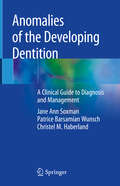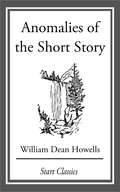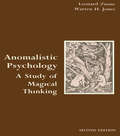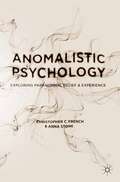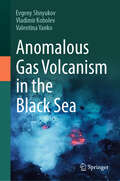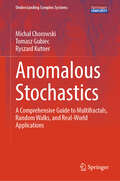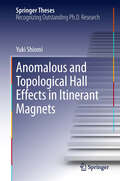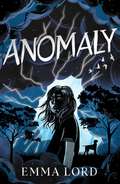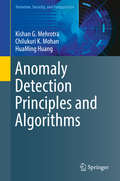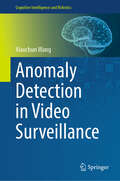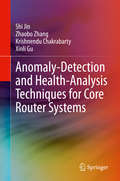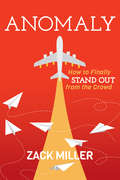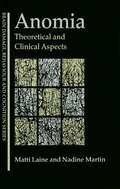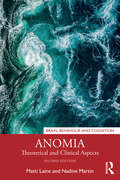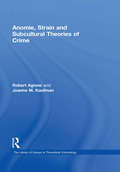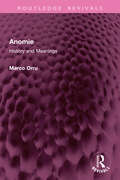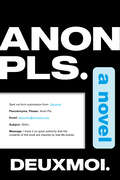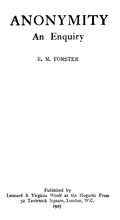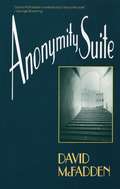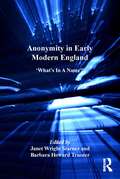- Table View
- List View
Anomalies of the Developing Dentition: A Clinical Guide To Diagnosis And Management
by Jane Ann Soxman Patrice Barsamian Wunsch Christel M. HaberlandThis book is an up-to-date, succinct, and easily accessible reference on the diverse anomalies that may arise in the developing dentition, including those relating to crown size and shape, tooth formation, tooth eruption, tooth number, and enamel and dentin formation. For each anomaly, information is provided on clinical and radiographic features, etiology, and management. Attention is also drawn to clinically relevant associations among anomalies. The inclusion of numerous high-quality photographs and images will assist the practitioner in establishing the correct diagnosis in each patient and in understanding the rationale for specific interventions. The book will also facilitate discussion of the anomaly with the caregiver or patient, including with respect to genetic and other implications and the appropriate treatment path. Anomalies of the Developing Dentition is an excellent clinical guide to the subject that will aid in timely identification and appropriate management. It will meet the needs of students and practitioners in multiple disciplines of both medicine and dentistry.
Anomalies of the Short Story: From 'Literature and Life'
by William Dean HowellsWilliam Dean Howells (March 1, 1837 - May 11, 1920) was an American realist author and literary critic... In 1858, he began to work at the Ohio State Journal where he wrote poetry, short stories, and also translated pieces from French, Spanish, and German. He avidly studied German and other languages and was greatly interested in Heinrich Heine. In 1860, he visited Boston and met with American writers James Thomas Fields, James Russell Lowell, Oliver Wendell Holmes, Nathaniel Hawthorne, Henry David Thoreau, and Ralph Waldo Emerson. Said to be rewarded for a biography of Abraham Lincoln used during the election of 1860, he gained a consulship in Venice. On Christmas Eve 1862, he married Elinor Mead at the American embassy in Paris. Upon returning to the U.S., he wrote for various magazines, including Atlantic Monthly and Harper's Magazine. From 1866, he became an assistant editor for the Atlantic Monthly and was made editor in 1871, remaining in the position until 1881. In 1869, he first met Mark Twain, which sparked a longtime friendship. Even more important for the development of his literary style--his advocacy of Realism--was his relationship with the journalist Jonathan Baxter Harrison, who in the 1870s wrote a series of articles for the Atlantic Monthly on the lives of ordinary Americans. He wrote his first novel, Their Wedding Journey, in 1872, but his literary reputation took off with the realist novel A Modern Instance, published in 1882, which described the decay of a marriage. His 1885 novel The Rise of Silas Lapham is perhaps his best known, describing the rise and fall of an American entrepreneur in the paint business. His socialviews were also strongly reflected in the novels Annie Kilburn (1888) and A Hazard of New Fortunes (1890). He was particularly outraged by the trials resulting from the Haymarket Riot
Anomalistic Psychology: A Study of Magical Thinking
by Warren H. Jones Leonard ZusneUpdating and expanding the materials from the first edition, Anomalistic Psychology, Second Edition integrates and systematically treats phenomena of human consciousness and behaviors that appear to violate the laws of nature. The authors present and detail a new explanatory concept they developed that provides a naturalistic interpretation for these phenomena -- Magical Thinking. For undergraduate and graduate students and professionals in cognitive psychology, research methods, thinking, and parapsychology.
Anomalistic Psychology: Exploring Paranormal Belief and Experience
by Anna Stone Christopher C. FrenchThe science behind claims of alien encounters and visions of ghosts can be even more fascinating than the sensationalist headlines. What leads some people to believe in the paranormal? Why might someone think they have been abducted by aliens? And is there any room for superstition in the modern world of science? Anomalistic Psychology* Provides a lively and thought-provoking introduction to the psychology underlying paranormal belief and experience * Covers the latest psychological theories and experiments, and examines the science at the heart of the subject * Uses a unique approach to apply different psychological perspectives - including clinical, developmental and cognitive approaches - to shed new light on the key debates Whether you are a psychology student or simply curious about the paranormal,Anomalistic Psychology is the essential introduction to this contested and controversial field. Belief in the paranormal has been reported in every known society since the dawn of time - find out why.
Anomalous Effects in Simple Metals
by Albert OverhauserUsing potassium as an example, this work presents a unique approach to the anomalous effects in metals, resulting in knowledge that can be applied to similar materials. Most theoretical predictions on the electric, magnetic, optical, and thermal properties of a simple metal do - surprisingly - not agree with experimental behavior found in alkali metals. The purpose of this volume is to document the many phenomena that have violated expectations. It collects in one place the research by Albert Overhauser, one of the pioneers of the field. His and his collaborators work has led to a unified synthesis of alkali metal peculiarities. The unique collection of 65 reprint papers, commented where necessary to explain the context and perspective, is preceded by a thorough and well paced introduction. The book is meant to advanced solid state physics and science historians. It might also serve as additional reading in advanced solid state physics courses. With a foreword by Mildred and Gene Dresselhaus
Anomalous Gas Volcanism in the Black Sea
by Evgeny Shnyukov Valentina Yanko Vladimir KobolevIn the Black Sea, an unprecedented intensity of gas discharge of the seabed in the form of jet emissions (gas seeps, torches, flares) and fountains of gas emissions from mud volcanoes have been established, which are described in detail in the monograph. However, the main attention is paid to anomalous single-stage methane emissions as a result of the famous Yalta earthquakes of 1927, accompanied by amazing and mysterious fiery phenomena. An analysis of the available geological and geophysical materials indicates that the fire phenomena were caused by massive methane emissions as a result of a powerful mantle gas-fluid flow into decompaction zones of the crystalline basement along tectonic faults of various scales within the Odessa-Sinop and Circum-Black Sea fault zones. Earthquakes served as a trigger for the activation of tectonic disturbances in the near-bottom sedimentary horizons for the migration of focused deep gas-fluid flows. The deep structure of the source zones and the nature of the seismic process are analyzed, the nature of the manifestations of fire phenomena is assessed. The enormous volumes of gas emissions are noted – millions of cubic meters of methane, which are proposed as a kind of gas plume, the nature of which is associated with zones of deep faults in the upper mantle. Using the geological and geophysical materials obtained in recent years, the authors significantly refined the structural-tectonic construction and localization of gas-mud activity in the Black Sea water area. All these new materials, along with an analysis of the available data on the seismicity of the Crimean region, open up the possibility of explaining the fiery phenomena that were observed during the Yalta earthquakes of 1927 and facilitate the interpretation and understanding of their nature.
Anomalous Relaxation in Colloidal Systems (Springer Theses)
by Avinash KumarThe thesis presents a systematic study of the Mpemba effect in a colloidal system with a micron-sized particle diffusing in a water bath. While the Mpemba effect, where a system’s thermal relaxation time is a non-monotonic function of the initial temperature, has been observed in water since Aristotle’s era, the underlying mechanism of the effect is still unknown. Recent studies indicate that the effect is not limited to water and has been studied both experimentally and numerically in a wide variety of systems. By carefully designing a double-well potential using feedback-based optical tweezers, the author demonstrates that an initially hot system can sometimes cool faster than an initially warm system. The author also presents the first observation in any system of another counterintuitive effect—the inverse Mpemba effect—where the colder of the two samples reaches the thermal equilibrium at a hot temperature first. The results for both the observations agree with theoretical predictions based on the Fokker-Planck equation. The experiments reveal that, for carefully chosen conditions, a strong version of both of the effects are observed where a system can relax to the bath temperature exponentially faster than under typical conditions.
Anomalous Stochastics: A Comprehensive Guide to Multifractals, Random Walks, and Real-World Applications (Understanding Complex Systems)
by Michał Chorowski Tomasz Gubiec Ryszard KutnerThis textbook provides a comprehensive exploration of anomalous stochastic processes and extreme events, commonly referred to as "black swans," with a particular focus on (multi-)fractal approaches and continuous-time random walks. The authors present a systematic examination of the subject, tracing its inception and providing a multi-directional perspective. By drawing on real-world experiences in finance, physics, and technology, the book underscores the practical relevance of anomalous stochastic processes for practitioners dealing with real-world data from complex systems. The content is based on a series of interdisciplinary physics lectures that have been delivered to undergraduate and graduate students at the University of Warsaw for nearly two decades. Updated to reflect recent developments, this book is a valuable resource for graduate students, ambitious undergraduate students, and researchers interested in random processes and the practical implications of anomalous processes. Familiarity with fundamental principles of probability theory, algebra, and basic concepts of differential and integral calculus is assumed, while a foundational understanding of mathematical statistics, stochastic processes, and statistical thermodynamics is recommended. Additionally, each chapter includes practical exercises designed to help readers master the concepts, develop practical skills, and serve as teaching material.
Anomalous and Topological Hall Effects in Itinerant Magnets (Springer Theses)
by Yuki ShiomiThis book presents an investigation of the anomalous and topological Hall effects in some itinerant ferromagnets and helimagnets by measurements of Hall effects driven by electrical or heat current. New clarifications are provided for spin-dependent Hall effects induced by the Berry phase, skew scattering, and scalar spin chirality. The author reveals the scattering-free nature of the Berry-phase-induced anomalous Hall current by conducting the first comparative study of electrical and thermal Hall effects. The impurity-element dependence of the anomalous Hall effect caused by skew scattering is systematically investigated in the low-resistivity region for Fe. Two new examples showing a topological Hall effect are found in helimagnets, in which nonzero scalar spin chirality arises from the modulation of spin structure through Dzyaloshinsky-Moriya (DM) interaction. Such a DM-interaction-mediated topological Hall effect is a new type of topological Hall effect. Also the temperature dependence of topological Hall terms in the thermal Hall effect and Nernst-Ettingshausen effect is found to be totally different from that in the electrical Hall effect. These results will be useful for applications of spin current to devices with low power consumption.
Anomaly
by Emma LordPiper Manning survived the apocalypse. Barely.She recovered from the virus that killed millions, but it left behind a new, uncontrollable power that's forced her to isolate herself from others - for their sake.Then an injured boy shows up at her mountain hideaway. And what hurt Seth is out to get her, too.Now she's on the run, risking everything for a shot at an actual future. But to get there, she'll have to trust a stranger, control her abilities ... and face her ghosts.Because the end of the world was just the beginning.A high-octane YA debut, Anomaly will force you to question destiny, memory and how far you would go to survive.
Anomaly
by Emma LordPiper Manning survived the apocalypse. Barely.She recovered from the virus that killed millions, but it left behind a new, uncontrollable power that's forced her to isolate herself from others - for their sake.Then an injured boy shows up at her mountain hideaway. And what hurt Seth is out to get her, too.Now she's on the run, risking everything for a shot at an actual future. But to get there, she'll have to trust a stranger, control her abilities ... and face her ghosts.Because the end of the world was just the beginning.A high-octane YA debut, Anomaly will force you to question destiny, memory and how far you would go to survive.
Anomaly (Anomaly #1)
by Krista McgeeThalli has fifteen minutes and twenty-three seconds to live. The toxic gas that will complete her annihilation is invading her bloodstream. But she is not afraid. Decades before ThalliÆs birth, the world was decimated by a nuclear war. But life continued deep underground, thanks to a handful of scientists known as The Ten. There they created genetically engineered human beings who are free of emotions in the hope that war wonÆt threaten the world again. Thalli is an anomaly, born with the ability to feel emotions and a sense of curiosity she can barely contain. She has survived so far by hiding her differences. But then her secret is discovered when sheÆs overwhelmed by the emotion of an ancient piece of music. The Ten quickly schedule her annihilation, but her childhood friend, Berkùa scientist being groomed by The Tenùconvinces them to postpone her death and study her instead. While in the ScientistsÆ Pod, Thalli and Berk form a dangerous alliance, one strictly forbidden by the constant surveillance. As her life ticks a way, she hears rumors of someone called the Designerùsomeone even more powerful than The Ten. WhatÆs more, the parts of her that have always been an anomaly could in fact be part of a much larger plan. And the parts of her that she has always guarded could be the answer sheÆs been looking for all along.Thalli must sort out what to believe and who to trust, before her time runs out. ô. . . the first in what has the potential to be a fascinating trilogy of general appeal. McGeeÆs simple narrative belies the novelÆs complexity, a factor that will make this intriguing book accessible to a wide variety of teen readers.ö ùBooklist
Anomaly Detection Principles and Algorithms (Terrorism, Security, and Computation)
by Chilukuri K. Mohan Kishan G. Mehrotra HuaMing HuangThis book provides a readable and elegant presentation of the principles of anomaly detection,providing an easy introduction for newcomers to the field. A large number of algorithms are succinctly described, along with a presentation of their strengths and weaknesses. The authors also cover algorithms that address different kinds of problems of interest with single and multiple time series data and multi-dimensional data. New ensemble anomaly detection algorithms are described, utilizing the benefits provided by diverse algorithms, each of which work well on some kinds of data. With advancements in technology and the extensive use of the internet as a medium for communications and commerce, there has been a tremendous increase in the threats faced by individuals and organizations from attackers and criminal entities. Variations in the observable behaviors of individuals (from others and from their own past behaviors) have been found to be useful in predicting potential problems of various kinds. Hence computer scientists and statisticians have been conducting research on automatically identifying anomalies in large datasets. This book will primarily target practitioners and researchers who are newcomers to the area of modern anomaly detection techniques. Advanced-level students in computer science will also find this book helpful with their studies.
Anomaly Detection in Video Surveillance (Cognitive Intelligence and Robotics)
by Xiaochun WangAnomaly detection in video surveillance stands at the core of numerous real-world applications that have broad impact and generate significant academic and industrial value. The key advantage of writing the book at this point in time is that the vast amount of work done by computer scientists over the last few decades has remained largely untouched by a formal book on the subject, although these techniques significantly advance existing methods of image and video analysis and understanding by taking advantage of anomaly detection in the data mining community and visual analysis in the computer vision community. The proposed book provides a comprehensive coverage of the advances in video based anomaly detection, including topics such as the theories of anomaly detection and machine perception for the functional analysis of abnormal events in general, the identification of abnormal behaviour and crowd abnormal behaviour in particular, the current understanding of computer vision development, and the application of this present understanding towards improving video-based anomaly detection in theory and coding with OpenCV. The book also provides a perspective on deep learning on human action recognition and behaviour analysis, laying the groundwork for future advances in these areas. Overall, the chapters of this book have been carefully organized with extensive bibliographic notes attached to each chapter. One of the goals is to provide the first systematic and comprehensive description of the range of data-driven solutions currently being developed up to date for such purposes. Another is to serve a dual purpose so that students and practitioners can use it as a textbook while researchers can use it as a reference book. A final goal is to provide a comprehensive exposition of the topic of anomaly detection in video media from multiple points of view.
Anomaly-Detection and Health-Analysis Techniques for Core Router Systems
by Krishnendu Chakrabarty Zhaobo Zhang Xinli Gu Shi JinThis book tackles important problems of anomaly detection and health status analysis in complex core router systems, integral to today’s Internet Protocol (IP) networks. The techniques described provide the first comprehensive set of data-driven resiliency solutions for core router systems. The authors present an anomaly detector for core router systems using correlation-based time series analysis, which monitors a set of features of a complex core router system. They also describe the design of a changepoint-based anomaly detector such that anomaly detection can be adaptive to changes in the statistical features of data streams. The presentation also includes a symbol-based health status analyzer that first encodes, as a symbol sequence, the long-term complex time series collected from a number of core routers, and then utilizes the symbol sequence for health analysis. Finally, the authors describe an iterative, self-learning procedure for assessing the health status.Enables Accurate Anomaly Detection Using Correlation-Based Time-Series Analysis;Presents the design of a changepoint-based anomaly detector;Includes Hierarchical Symbol-based Health-Status Analysis;Describes an iterative, self-learning procedure for assessing the health status.
Anomaly: How to Finally Stand Out From the Crowd
by Zack MillerAnomaly provides proven financially conscious and easy-to-implement methods for those who want to turn heads, be memorable, and become the anomaly. Rather than rambling about high level topics that turn out to be nothing more than a plethora of cliché “rah rah” phrases that are supposed to get people excited about business, Zack Miller, an award-winning business man, shows readers what they can do today to grow their brand. Anomaly teaches readers how to stand out from the millions of people fighting for attention; addresses both online and in person strategies; helps readers grasp the concept of confidence when building an audience; showcases proven case studies of methods in action; and includes methods that cost less than the book itself. Whether they are a marketing professional or an individual striving to stand out from the crowd, Anomaly teaches readers things they can implement immediately to start seeing results—things they may not have thought about or believed they can do. For those who are tired of spinning their wheels and making no progress, Anomaly reveals how to start moving forward.
Anomia: Theoretical and Clinical Aspects (Brain, Behaviour and Cognition)
by Matti Laine Nadine MartinNaming is a fundamental aspect of language. Word-finding deficit, anomia, is the most common symptom of language dysfunction occurring after brain damage. Besides its practical importance, anomia gives a fascinating view on the inner workings of language in the brain. There has been significant progress in the study of anomia in recent years, including advances in neuroimaging research and in psycholinguistic modelling. Written by two internationally known researchers in the field, this book provides a broad, integrated overview of current research on anomia. Beginning with an overview of psycholinguistic research on normal word retrieval as well as the influential cognitive models of naming, the book goes on to review the major forms of anomia. Neuroanatomical aspects, clinical assessment, and therapeutic approaches are reviewed and evaluated. Anomia: Theoretical and Clinical Aspects gives a thorough and up-to-date examination of the research and treatment of naming disorders in neurological patients. It covers both theory and practice and provides invaluable reading for researchers and practitioners in speech and language disorders, neuropsychology and neurology, as well for advanced undergraduate students and graduate students in the field.
Anomia: Theoretical and Clinical Aspects (Brain, Behaviour and Cognition)
by Matti Laine Nadine MartinThis important book provides a broad, integrated overview of current research on word-finding deficit, anomia, the most common symptom of language dysfunction occurring after brain damage. Besides its clinical importance, anomia gives a fascinating view on the inner workings of language in the brain. Written by two internationally known researchers in the field, the book begins with an overview of psycholinguistic research on normal word retrieval as well as the influential cognitive models of naming and goes on to review the major forms of anomia. Neuroanatomical aspects, clinical assessment and therapeutic approaches are reviewed and evaluated. This edition has been fully updated to include coverage of advances in cognitive modeling of lexical retrieval disorders, structural and functional neuroimaging findings on the neural basis of naming and anomia, anomia diagnostics and new approaches to the challenging task of anomia therapy. Covering both theory and practice, this book provides invaluable reading for researchers and practitioners in speech and language disorders, neuropsychology and neurology, as well as for advanced undergraduate students and graduate students in the field.
Anomie, Strain and Subcultural Theories of Crime (The Library of Essays in Theoretical Criminology)
by Joanne M. KaufmanAnomie, strain and subcultural theories are among the leading theories of crime. Anomie theories state that crime results from the failure of society to regulate adequately the behavior of individuals, particularly the efforts of individuals to achieve monetary success. Strain theories focus on the impact of strains or stressors on crime, including the inability to achieve monetary success through legal channels. And subcultural theories argue that some individuals turn to crime because they belong to groups that excuse, justify or approve of crime. This volume presents the leading selections on each theory, including the original statements of the theories, key efforts to revise the theories, and the latest statements of each theory. The coeditors, Robert Agnew and Joanne Kaufman, are prominent strain theorists; and their introductory essay provides an overview of the theories, discusses the relationship between them, and introduces each of the selections.
Anomie: History and Meanings (Routledge Revivals)
by Marco OrruFirst published in 1987, Anomie examines essential moments of Western thought, tracing the complex concept of anomie. The Greek origin of the term (a-nomia, absence of joy) relates it to the notions of disorder, inequity and anarchy. 20th century sociology has long called into question an over simple dichotomy between law and the absence of law. The book shows that this questioning is not new. It has its roots in Ancient Greek thought and in the founding texts of the Judeo-Christian tradition. It appears in the legal and religious states of the English Renaissance, and in the emerging sociology of 19th century French, where Orrù opposes the collectivism of Durkheim to the individualism of Jean-Marie Guyau. The latter’s thought, little recognized at that time, finds an echo in contemporary sociology, notably in American sociologist R. K. Merton. To write the history of the concept, to account for the fluctuations in meaning that it undergoes in the changing prism of diverse societies, to uncover the subterranean continuities between yesterday and today: this is the aim of the book. This book will be of interest to students of history, sociology, literature and philosophy.
Anon Pls.: A Novel
by Deuxmoi"Dazzling, propulsive, and delightfully juicy, Anon Pls. is the digital age’s love letter to The Devil Wears Prada. Sexy, suspenseful, and so good you won’t want to put it down—not even to check on the latest stories in Deuxmoi’s feed. What an incredible debut." — Christina Lauren, New York Times bestselling author of The UnhoneymoonersFrom the creator of @Deuxmoi, the popular – and infamous – celebrity gossip Instagram, comes a fun and charming debut novel about a stylist assistant whose drunken decision to turn her Instagram into a celeb gossip account turns her life completely upside down. When Cricket Lopez, assistant to one of the most notorious celebrity stylists, revamps her old fashion Instagram account and turns it into a source for celebrity gossip on a drunken whim, she never thinks it will become anything. It's just a way to blow off steam after a terrible, terrible day at work where her nightmarish boss screams at her and blames her for some 18-year-old influencer's screw-up. But when the account grows overnight and, even wilder, when she starts getting gossip from fans and insiders – juicy gossip – she has to face facts: her Instagram is now famous. She is now famous.Though no one knows that she is behind the account, its newfound success quickly wreaks havoc on her real life. Her boss wonders why she’s disappearing on the job, her friends are increasingly irritated by her dedication to the account, and she has celebrities, investors, and journalists approaching her nonstop. Plus, there's a steamy new love interest who she meets through her online persona—except she has no idea if she can truly trust his motives. As the account grows and becomes more and more influential, she has to wonder: is it – the fame, the insider access, the escape from real life – really worth losing everything she has?
Anonymity Suite
by David McfaddenAnonymity Suite reaffirms David McFadden’s reputation as one of the more interesting and completely enjoyable voices in Canadian poetry. Like a Pre-Raphaelite painter, he is able to join various objects, experiences, voices, and moods in a single canvas. A poem may begin with someone studying Italian on the shore of Lake Como, or drinking kava with firewalkers in the South Seas, and end up with Kelly Gruber and the notorious Skydome heckler. Formally, this is very much a suite of poems, using images from nature, history, and culture to unite thematic strands dealing with sentimentality and anonymity, joy and grief, personality and universality, and a wealth of philosophical and ethical concerns.
Anonymity in Early Modern England: 'What's In A Name?'
by Barbara Howard TraisterExpanding the scholarly conversation about anonymity in Renaissance England, this essay collection explores the phenomenon in all its variety of methods and genres as well as its complex relationship with its alter ego, attribution studies. Contributors address such questions as these: What were the consequences of publishing and reading anonymous texts for Renaissance writers and readers? What cultural constraints and subject positions made anonymous publication in print or manuscript a strategic choice? What are the possible responses to Renaissance anonymity in contemporary classrooms and scholarly debate? The volume opens with essays investigating particular texts-poetry, plays, and pamphlets-and the inflection each genre gives to the issue of anonymity. The collection then turns to consider more abstract consequences of anonymity: its function in destabilizing scholarly assumptions about authorship, its ethical ramifications, and its relationship to attribution studies.
Anonymity in Eighteenth-Century Italian Publishing: The Absent Author (New Directions in Book History)
by Lodovica BraidaThis book focuses on the different forms in which authorship came to be expressed in eighteenth-century Italian publishing. It analyses both the affirmation of the “author function”, and, above all, its paradoxical opposite: the use of anonymity, a centuries-old practice present everywhere in Europe but often neglected by scholarship. The reasons why authors chose to publish their works anonymously were manifold, including prudence, fear of censorship, modesty, fear of personal criticism, or simple divertissement. In many cases, it was an ethical choice, especially for ecclesiastics. The Italian case provides a key perspective on the study of anonymity in the European context, contributing to the analysis of an overlooked topic in academic studies.
